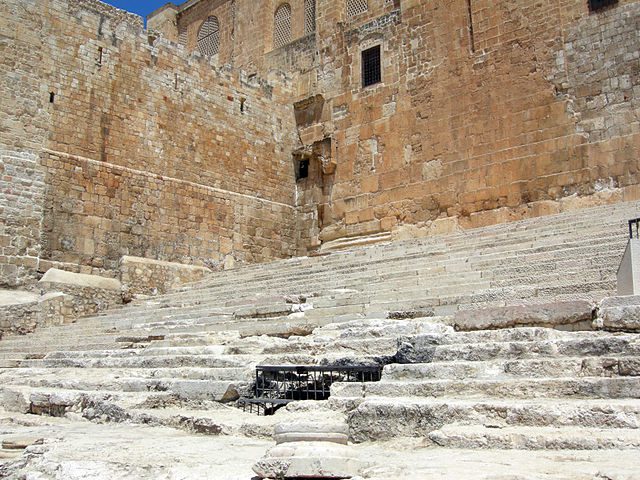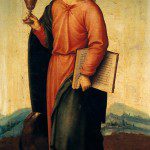
1st century southern steps leading up to Herod’s Temple. Jesus walked these steps (and I did, too, in 2014) [public domain / Wikimedia Commons]
***
[3-25-07; slight editing and minor additions on 8-8-16]
***
The apostles worshiped at the temple in Jerusalem and at synagogues. The Jews didn’t even accept the Trinity (they were and are like Muslims in that regard). Jesus continued to worship at the temple and synagogues; so did Paul.
I believe there was a mandatory tithe or something of that sort, that supported the priests. Jesus in all likelihood continued to pay that, so He supported non-Christian worship practices and buildings.
Jesus even commanded His disciples to obey what the Pharisees taught (Matt 23:2-3), and Paul acknowledged the high priest’s authority even when he was being persecuted by the Jews (Acts 23:2-5), and called himself a Pharisee (Acts 23:6; 26:5) during his trial. That was after Jesus’ Resurrection. Jesus highly commended the faith of the Roman centurion, who wasn’t even a practicing Jew, let alone a Christian.
Christians continued to worship in the old ways until (at the very least) the council of Jerusalem and (more definitively) the fall of Jerusalem in 70 AD. For example, Paul “and his company” are described as worshiping at a synagogue:
Acts 13:13-15 (RSV) Now Paul and his company set sail from Paphos, and came to Perga in Pamphyl’ia. And John left them and returned to Jerusalem; [14] but they passed on from Perga and came to Antioch of Pisid’ia. And on the sabbath day they went into the synagogue and sat down. [15] After the reading of the law and the prophets, the rulers of the synagogue sent to them, saying, “Brethren, if you have any word of exhortation for the people, say it.”
The sabbath day was, of course, Saturday. Paul and his friends were not only worshiping at the synagogue, but were actually invited by the “rulers” to preside over the service. The text records what Paul said, and then we learn:
Acts 13:42-44 As they went out, the people begged that these things might be told them the next sabbath. [43] And when the meeting of the synagogue broke up, many Jews and devout converts to Judaism followed Paul and Barnabas, who spoke to them and urged them to continue in the grace of God. [44] The next sabbath almost the whole city gathered together to hear the word of God.
Acts 18:4 tells us that Paul “argued in the synagogue every Sabbath”, seemingly implying that he was worshiping there, too.
Acts 18:8 states: “Crispus, the ruler of the synagogue, believed in the Lord, together with all his household . . .”
According to Acts 3:1 (right after the Day of Pentecost), “Peter and John were going up to the temple at the hour of prayer, the ninth hour.”
The notes in my RSV explain that the ninth hour was 3 PM “when sacrifice was offered with prayer (Ex 29.39; Lev. 6.20; Josephus, Ant. xiv.4.3).”
Acts 2:46 described the early Christians: “And day by day, attending the temple together and breaking bread in their homes, they partook of food with glad and generous hearts,”
I’ve now shown with several examples, that Christians after Pentecost (including Paul, Peter, and John) worshiped in the regular temple services or at synagogues. Now, almost certainly both the temple and the synagogues had some sort of money collection (rabbis and priests had to eat and have some sort of shelter and clothing, after all).
So all they had to do was contribute to that and therefore they would be contributing to the religion of Judaism, which denies the Holy Trinity, the incarnation, the Resurrection of Jesus, and other aspects of Christianity, though it also agrees with much of what we believe (and I would argue that Christianity is a consistent development of the OT and OT Judaism, and that Jesus did not even overturn the Law; only modified it and taught a different application — Matthew 5:17-20).
Therefore, the early Christians in effect supported a (partially) false religion (Judaism) by not only money but also direct participation in its worship services. What this means is that some forms of religious participation do not imply carte blanche agreement with everything in the religion(s) involved. It’s neither indifferentism nor theological liberalism. The apostles agreed with some parts of Judaism, and disagreed with others (especially its denial that Jesus was Messiah and God incarnate).
*****
Meta Description: Analysis of the implications of early Christian worship in synagogues and the temple in Jerusalem.
Meta Keywords: Jews, Judaism, Old Testament, Hebrew Bible, Jews & Christians, Judaism & Christianity, Hebrews, Israelites, Pharisees, Pharisaism, Messiah, temple, rabbis, synagogues, Torah, Talmud, Jewish law, Mosaic law, law & grace













